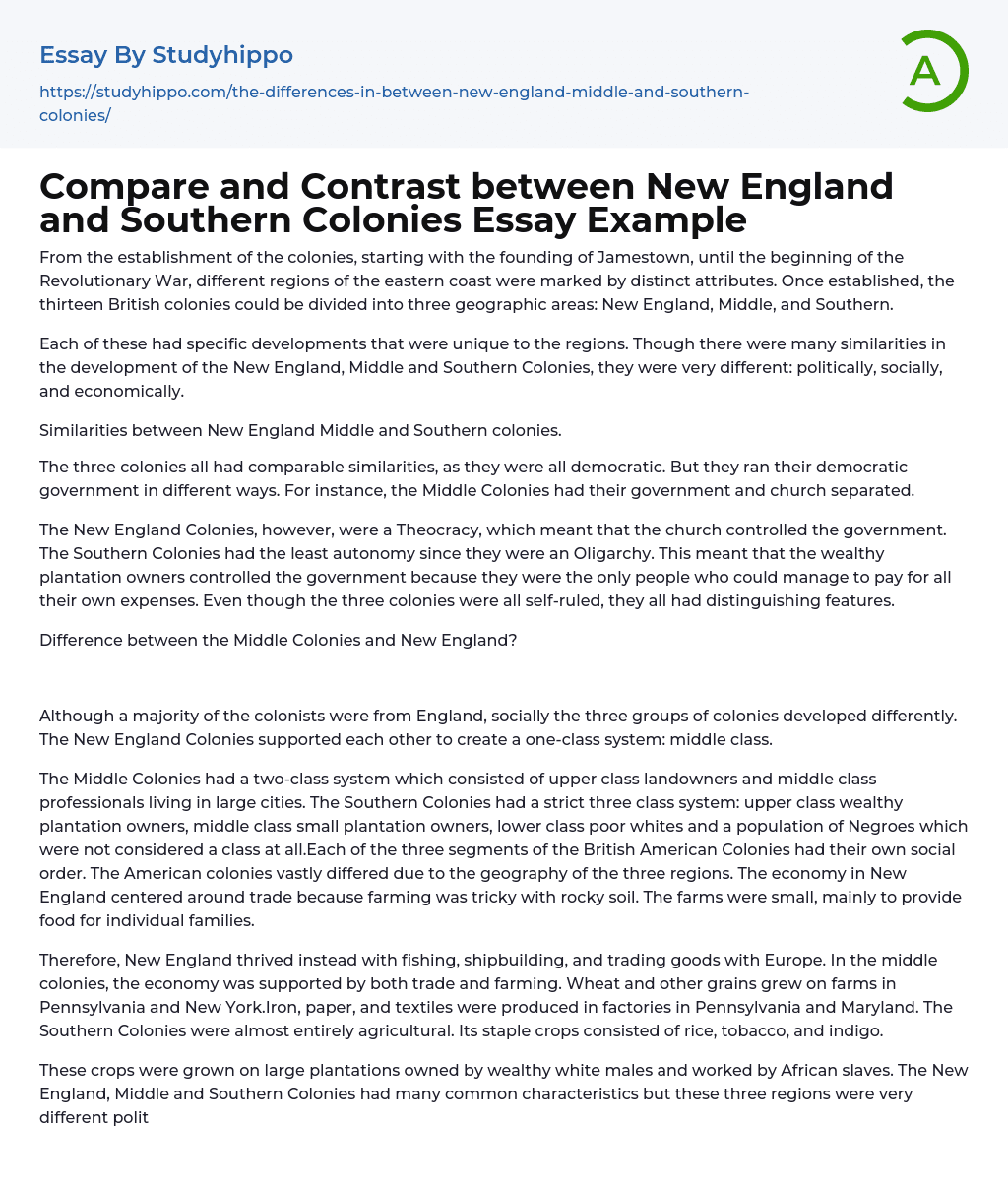

Compare and Contrast between New England and Southern Colonies Essay Example
From the establishment of the colonies, starting with the founding of Jamestown, until the beginning of the Revolutionary War, different regions of the eastern coast were marked by distinct attributes. Once established, the thirteen British colonies could be divided into three geographic areas: New England, Middle, and Southern.
Each of these had specific developments that were unique to the regions. Though there were many similarities in the development of the New England, Middle and Southern Colonies, they were very different: politically, socially, and economically.
Similarities between New England Middle and Southern colonies.
The three colonies all had comparable similarities, as they were all democratic. But they ran their democratic government in different ways. For instance, the Middle Colonies had their government and church separated.
The New England Colonies, however, were a Theocracy, which meant that the church controlled
...the government. The Southern Colonies had the least autonomy since they were an Oligarchy. This meant that the wealthy plantation owners controlled the government because they were the only people who could manage to pay for all their own expenses. Even though the three colonies were all self-ruled, they all had distinguishing features.
Difference between the Middle Colonies and New England?
Although a majority of the colonists were from England, socially the three groups of colonies developed differently. The New England Colonies supported each other to create a one-class system: middle class.
The Middle Colonies had a two-class system which consisted of upper class landowners and middle class professionals living in large cities. The Southern Colonies had a strict three class system: upper class wealthy plantation owners, middle class small plantation owners, lower class poor whites and a population of Negroes which were not
considered a class at all.Each of the three segments of the British American Colonies had their own social order. The American colonies vastly differed due to the geography of the three regions. The economy in New England centered around trade because farming was tricky with rocky soil. The farms were small, mainly to provide food for individual families.
Therefore, New England thrived instead with fishing, shipbuilding, and trading goods with Europe. In the middle colonies, the economy was supported by both trade and farming. Wheat and other grains grew on farms in Pennsylvania and New York.Iron, paper, and textiles were produced in factories in Pennsylvania and Maryland. The Southern Colonies were almost entirely agricultural. Its staple crops consisted of rice, tobacco, and indigo.
These crops were grown on large plantations owned by wealthy white males and worked by African slaves. The New England, Middle and Southern Colonies had many common characteristics but these three regions were very different politically, socially, and economically. Politically, all the colonies had some degree of self-government, but they went about it in different ways.Socially, most of the colonists were from England, but the class systems were very different in all three colonies. Economically, the colonies were different due to the geographic and social opportunities of the three regions. British American Colonies had a few similarities, but were, for the most part, vastly different.
Works Cited Kelly, Martin. "Overview of Colonial America 1607 - 1754. " About. com.
21 Sept. 2008 ."The 13 American Colonies. " Social Studies for Kids. 21 Sept.
2008 ."What were the differences between the New England middle and southern colonies? " WikiAnswers. 21 Sept. 2008 .
- Agriculture essays
- Albert einstein essays
- Animals essays
- Archaeology essays
- Bear essays
- Biology essays
- Birds essays
- Butterfly essays
- Cat essays
- Charles Darwin essays
- Chemistry essays
- Dinosaur essays
- Discovery essays
- Dolphin essays
- Elephant essays
- Eli Whitney essays
- Environmental Science essays
- Evolution essays
- Fish essays
- Genetics essays
- Horse essays
- Human Evolution essays
- Isaac Newton essays
- Journal essays
- Linguistics essays
- Lion essays
- Logic essays
- Mars essays
- Methodology essays
- Mineralogy essays
- Monkey essays
- Moon essays
- Mythology essays
- Noam Chomsky essays
- Physics essays
- Plate Tectonics essays
- Progress essays
- Reaction Rate essays
- Roman Numerals essays
- Scientific essays
- Scientific Method essays
- Scientist essays
- Seismology essays
- Space Exploration essays
- Stars essays
- Sun essays
- Thomas Edison essays
- Tiger essays
- Time Travel essays
- Universe essays



